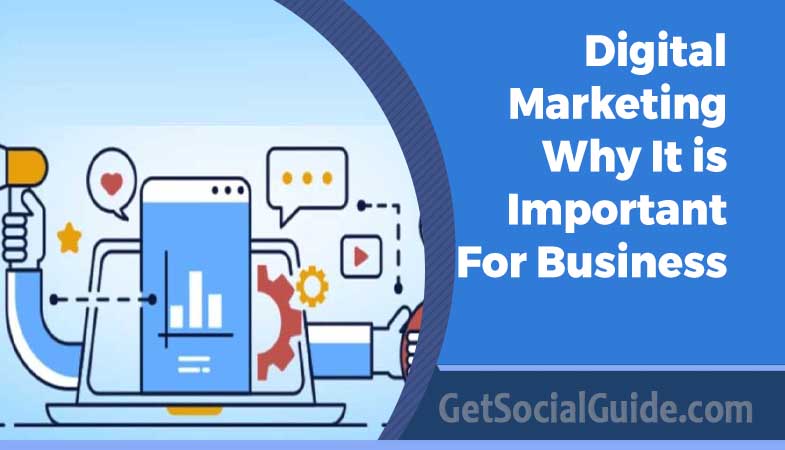Digital Marketing: Why Is It So Important for Business?
Businesses are reshaping. The whole corporate world is shifting to digital platforms. This business transformation is creating hundreds of opportunities online. Thankfully, digital marketing has evolved, and its horizons are getting broader and better year by year. As consumers are increasingly reaching out to companies or brands online, they have opportunities to adapt to their marketing strategies. It helps in staying competitive.
This post will enable you to understand the importance of digital marketing to a business. So, let’s start with the significance.

The Rise of Digital Marketing!
Digital marketing is a broad concept that involves a series of marketing methods. Simply put, it can range from search engine optimisation (SEO) to content marketing, social media marketing, email marketing, and pay-per-click (PPC) advertising. These methods prove milestones because of the internet and mobile devices. They have fundamentally changed business interactions with consumers. It can be tracked through statistics provided by Statista. It revealed that the global digital advertising market was approximately $537 billion in 2021, and it is likely to be around $786 billion by 2026.
Overall, digital marketing services are narrowing the gap between companies and consumers. And the brighter side is that the internet has become a platform to continue engagement, which sets the stage for cross-selling or remarketing. Overall, it is consistently filling the vacuum by encouraging engagement.
Enhanced Reach and Targeting
Physically reaching out to target audiences is a lengthy process that also needs massive funding. On the flip side, digital marketing promotes a business widely by reaching out to an intended audience. Also, it ensures precision in engaging with customers who are interested or have the potential to be. This is an outstanding capacity for digital marketing services. Above this, businesses can focus on specific demographics, interests, behaviours, and purchasing patterns. The in-depth analysis enables marketers to pitch or cross-sell offerings by reaching the right audience at the right time.
To prove it a concrete fact, eMarketer reported that 81% of marketers rely on audience targeting for extremely effective digital marketing. This targeted approach increases the likelihood of reaching the intended customers. This approach makes a campaign effective.
Cost-Effectiveness
Considering another reason why online marketing is crucial, its cost-effectiveness emerges in the spotlight. Unlike traditional advertising, digital platforms provide affordable promotion options. And its biggest beneficiaries are small and medium-sized enterprises (SMEs). They can make a high return on investment through various online ads, like social media advertising and email marketing.
HubSpot has found relatable facts in this regard. It reveals that businesses that emphasise blogging are 13 times more likely to witness a positive ROI. Another report by the Content Marketing Institute states that content marketing costs 62% less than traditional marketing methods. And the count of leads or inquiries is three times.
Measurable Results and Analytics
Results are crucial, especially when you can see them in real time. Door-to-door marketing made it a hell-like challenge to measure results in real time. In the case of Internet marketing, accessing insights into customer behaviour, campaign performance, and ROI makes it a hassle-free journey.
Marketers and businesses achieve this frictionless marketing experience through Google Analytics or any other analytics tool. With it, understanding and monitoring website traffic, user engagement, and conversion rates becomes way easier. And this practice leads to data-driven decisions, which can account for optimising campaigns and improving overall marketing strategies.
A survey by Demand Metric shows that 83% of marketers believe that data-driven marketing is vital for their success. And this success can be achieved by optimising campaigns, making informed decisions, and adapting overall marketing plans to insights.
Increased engagement and interaction
Engagement and customer interaction play a key role in the success of any marketing strategy or plan. Digital platforms like Facebook, Instagram, and Twitter allow businesses to engage through comments, likes, shares, and messages. This kind of interaction builds connection, and eventually, it develops trust between brands and their customers.
Sprout Social surveyed and found that 64% of consumers look out for brands on social media to connect. Another report by HubSpot discovered that an active social media presence increases 66% of leads or inquiries as compared to those who don’t. These statistics clearly indicate how crucial online engagement is from the perspective of business inquiries and ROI.
Personalisation and customer experience
Customers demand a personalised experience to continue their journey with brands. With the advent of digital marketing, delivering a personalised experience is no longer challenging. Smart marketers extract the web journey of customers to get insights into their behaviour, preferences, demographics, etc. Overall, individualised marketing enables companies to share relevant messages, which increases the likelihood of conversions.
Competitive Advantage
In this cutthroat, competitive world, creating your own identity or standing out from the crowd is not easy. Digital marketing services involve the need for tools that can help discover an online reputation, which helps make feasible decisions to create a strong online presence. Majorly, these decisions are related to engaging content, SEO (web optimisation), social media campaigns, etc. The success of these decisions adds a competitive edge.
Global Reach and Expansion
The International Trade Centre revealed that 56% of small and medium-sized enterprises (SMEs) reportedly notice an overwhelming response in exports. It was simply because of their online presence. It significantly demonstrates how crucial digital marketing is. Businesses can go beyond their limits and grab global opportunities. This global reach eventually leads to overwhelming growth and revenue generation.
Mobile marketing and accessibility
Since over 58% of global web traffic is using mobile devices, developing a digital presence has become the need of the hour. With billions of users on mobile phones, businesses have a golden opportunity to reach those consumers on their mobile apps, websites, or via SMS marketing. The mobile-first indexing update from Google has also made it mandatory to define and optimise online presence. This practice is called integrating mobile responsiveness. In essence, digital marketing helps capture the attention of mobile users.
Conclusion
Digital marketing is important for businesses because it attracts and multiplies prospects or business opportunities effortlessly. It ensures web optimisation so that no glitches can ever hamper a smooth user experience. It eventually benefits companies or businesses that develop a web platform to reach out to consumers according to their intent. The discovery of their intent leads to deriving recommendations, which increase sales.






